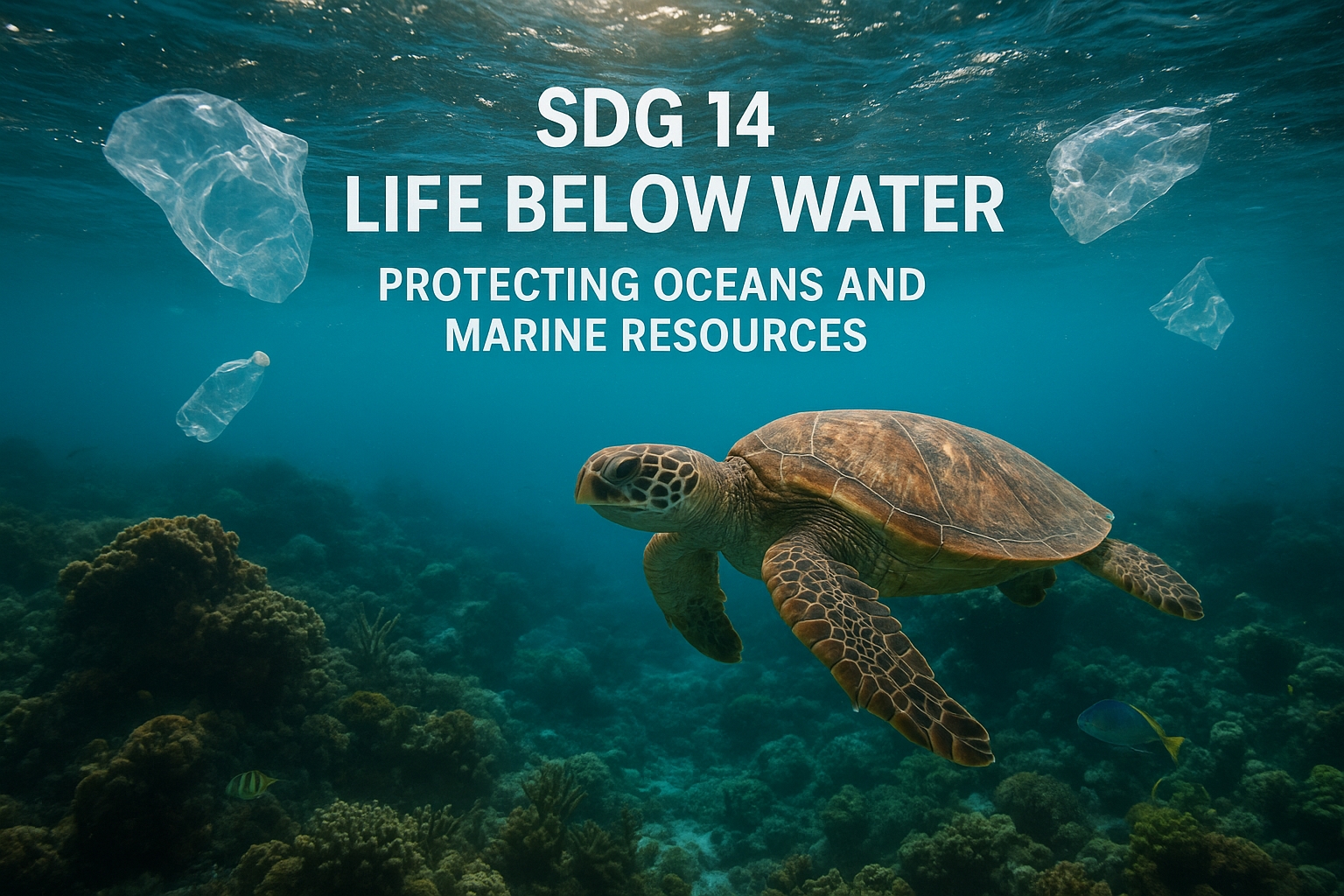SDG 14: Life Below Water — Protecting Oceans and Marine Resources
Introduction
Oceans cover over 70% of the Earth’s surface and are critical for regulating climate, supporting biodiversity, and sustaining billions of livelihoods. SDG 14 calls for the conservation and sustainable use of oceans, seas, and marine resources. For Pakistan, with its 1,000 km coastline along the Arabian Sea, marine pollution, overfishing, habitat destruction, and climate change pose growing threats. Islamic principles of stewardship, justice, and balance provide a guiding framework for restoring the health of oceans and ensuring their benefits for future generations.
Global Perspective
The oceans are the planet’s lifeline, but they are under unprecedented stress:
- Pollution: Over 8 million tons of plastic enter oceans annually, poisoning marine life and entering the food chain.
- Overfishing: Nearly 90% of global fish stocks are fully exploited, overexploited, or depleted.
- Climate Change: Ocean warming, acidification, and coral bleaching threaten marine biodiversity.
- Marine Ecosystems: Mangroves, coral reefs, and wetlands—natural barriers against storms and nurseries for fish—are vanishing rapidly.
- Blue Economy: Oceans contribute trillions of dollars annually in goods and services, from fisheries to shipping.
SDG 14 emphasizes conservation, reducing marine pollution, regulating fishing, protecting coastal ecosystems, and enhancing sustainable use of marine resources.
Pakistan’s Coastal and Marine Challenges
With a coastline stretching nearly 1,000 km, Pakistan has rich marine potential but faces serious challenges:
Overfishing
- Traditional fishing communities in Sindh and Balochistan face declining catches due to industrial trawling.
- Unsustainable practices (illegal nets, small mesh sizes) devastate juvenile fish populations.
Pollution and Habitat Destruction
- Karachi’s untreated sewage and industrial waste flow directly into the Arabian Sea.
- Plastic waste suffocates marine ecosystems, while mangroves are cut for fuel and urban expansion.
Climate Change and Rising Seas
- Coastal erosion and rising sea levels threaten Karachi, Thatta, and Badin.
- Warmer waters and salinity changes reduce fish stocks and harm biodiversity.
Neglect of Blue Economy
- Despite vast resources, Pakistan’s maritime economy is underdeveloped.
- Ports and shipping infrastructure are outdated, while eco-tourism potential remains untapped.
Challenges in Pakistan’s Marine Sustainability
- Weak enforcement of fishing regulations.
- Lack of waste treatment infrastructure.
- Poverty and dependence of coastal communities on unsustainable practices.
- Minimal investment in marine research and conservation.
- Absence of integrated coastal management policies.
Islamic Perspective
The Qur’an emphasizes the oceans as a sign of Allah’s majesty and a source of sustenance:
- Creation and Sustenance:
“And it is He who subjected the sea for you to eat from it tender meat and to extract from it ornaments which you wear.” (Qur’an 16:14) - Balance and Prohibition of Corruption:
“Do not spread corruption in the earth after it has been set in order.” (Qur’an 7:56) - Stewardship and Justice: Marine resources are an Amanah (trust), not to be squandered or monopolized.
- Prophetic Guidance: The Prophet ﷺ allowed the use of sea water for purification and affirmed the permissibility of eating its creatures, highlighting its centrality to human survival.
Islam therefore frames the seas as both a blessing and a responsibility, urging humanity to preserve them for collective benefit.
Economic Lens
Pakistan’s blue economy offers untapped opportunities:
- Fisheries: Regulated and modernized fishing can ensure sustainable livelihoods and exports.
- Ports and Shipping: Investment in Gwadar and Karachi can position Pakistan as a regional maritime hub.
- Tourism: Eco-tourism, diving, and coastal recreation could boost local economies.
- Renewable Energy: Offshore wind and tidal energy can diversify Pakistan’s energy mix.
Failure to harness these opportunities risks further poverty in coastal areas and continued environmental degradation.
Strategic Recommendations
The recommendations here are strategic options. They must be piloted locally, tested, and adapted before full-scale implementation. Citizen participation and political will are non-negotiable.
Regulate Fishing Practices
- Enforce bans on illegal trawling and destructive nets.
- Support small-scale fishermen with modern technology and fair markets.
Pollution Control
- Build sewage treatment plants in Karachi and coastal towns.
- Launch anti-plastic campaigns and improve waste management.
Mangrove and Coastal Protection
- Expand mangrove restoration in Sindh and Balochistan.
- Protect wetlands as breeding grounds for marine life.
Blue Economy Development
- Invest in ports, shipping, and sustainable fisheries.
- Promote eco-tourism and marine conservation programs.
Climate Adaptation
- Strengthen coastal defenses against erosion and rising seas.
- Develop disaster preparedness for coastal communities.
Conclusion
Life below water is central to food security, climate stability, and economic prosperity. Pakistan’s seas, though rich in resources, are endangered by pollution, overfishing, and neglect. By aligning with SDG 14, embracing Islamic ethics of stewardship, and investing in a sustainable blue economy, Pakistan can restore its coastal ecosystems and secure prosperity for generations.


